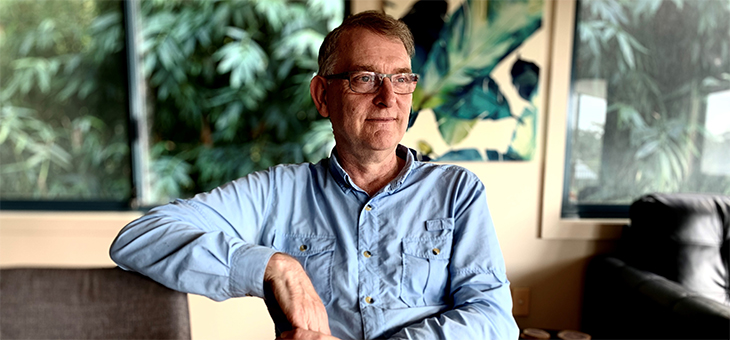When Melbourne musicians Kate Golby and Zac Anthony needed help buying their first home six years ago, Zac’s dad agreed to sign up as guarantor for the loan.
“It would have been another 10 years of dedicated saving just to get a 5 per cent deposit and prices were just going up and up and up,” Ms Goldby says.
A guarantor home loan is when someone, usually a close relative like a parent, offers up part of their home equity as security to top up the buyer’s cash deposit.
It means the buyer only needs a small deposit or sometimes none at all, and avoids paying costly lender’s mortgage insurance (LMI).
If the first home buyer defaults on the loan the banks can go after the parents for the repayments instead, with the guarantor’s home at stake.
For Kate Goldby, her father-in-law’s willingness to guarantee the loan meant they were able to get a foot on the property ladder much sooner.
“We were able to get out of the rental market and get into our own place and put the money towards an investment instead,” she adds.
Mortgage broker Ryan O’Keefe says the number of first home buyer clients on his books getting help from their parents has almost doubled in the past three years.
The most common ways parents help are guarantor home loans, cash gifts or loans.
“It’s gone from 30 to 40 per cent to 70 per cent needing help,” he observes.
The reason is soaring house prices.
“Many years ago it was easier to get a bigger deposit, because the housing prices were not so expensive, now getting a 20 per cent deposit is very difficult task unless you are buying [in] rural areas,” Mr O’Keefe says.
He says, in his experience, the average time for a guarantor to be released from the loan is three years in a hot market like Melbourne.
That’s because when the value of the house exceeds the guarantor’s portion of the loan, their home’s equity is no longer needed as security for the loan.
Banks say guarantor loans have remained steady
Despite the current buying frenzy, the big four banks say the number of first home buyers using guarantor loans has remained steady.
NAB prefers first home buyers to pay for lender’s mortgage insurance, which can add around $20,000 to a loan.
| Financial institution | Percentage of First Home Buyer (FHB) guarantor loans |
|---|---|
| Commonwealth Bank | 20 per cent |
| Westpac | 15 per cent |
| ANZ | 11 per cent |
| NAB | 1 per cent, 40 per cent of first home buyers paying LMI |
But banks don’t collect data on how many first home buyers get a cash gift or loan from their parents.
“The lender wants to see 5 per cent of genuine savings to show they have been saving themselves, but if there is more than a 10 per cent deposit the lender generally doesn’t mind where it has come from,” Mr O’Keefe says.
Bank of Mum and Dad ‘ninth biggest lender’
Martin North from Digital Finance Analytics has been surveying first home buyers, as well as other segments of the property market, for 10 years.
He says the number of people getting help from their parents to get into the property market is at record levels.
In the March quarter, 60 per cent of first home buyers surveyed had received financial help from their parents.
The average financial contribution from parents was $89,637, slightly higher than the previous peak in early 2018 when property prices booming.
Mr North says that makes what’s known as the ‘Bank of Mum and Dad’ (when parents help out their children financially) the country’s ninth biggest lender, after Suncorp.
“Over the last 12 months we have had government stimulus, and access to super and there has been a bit of a purple patch in terms of people accessing the market,” he notes.
“The Bank of Mum and Dad is probably one of the most critical yet least understood issues in regard to what has been going on.”
And Mr North believes the cash splash from parents is contributing to the current record property prices.
“In the process of doing that we are looking at an inter-generational wealth shift, and some first home buyers are getting sucked in and paying too much, and if prices do come off their tops later they could even end up in negative equity,” he warns.
Regulatory blind spot
He says the Bank of Mum and Dad is a blind spot for the regulators and the banks.
“My research says that people who get such a gift from parents are three times more likely to default on their loan in the subsequent five years,” he observes.
“So that means we could be looking at higher risks in the portfolios, than the banks recognise or understand.”
Ms Goldby acknowledges her family is among the lucky ones.
“We are so grateful for the opportunity.”
And for them, a guarantor loan was a risk that paid off.
They recently sold their first home, released Zac’s dad as the guarantor, and are building their dream home on the Victorian coast.
“We have a bigger place, everyone has their own bedroom, we have got a studio, a 20 min walk to the beach … It is going to be really nice.”
 © 2020 Australian Broadcasting Corporation. All rights reserved.
© 2020 Australian Broadcasting Corporation. All rights reserved.
ABC Content Disclaimer

